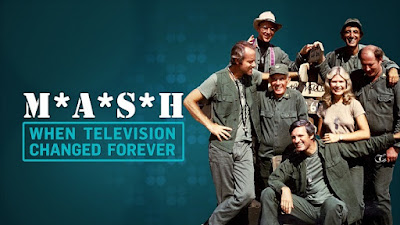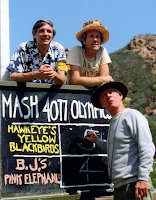During the early to mid-1980s, if you didn’t want to the local nightly news, you probably had to watch MASH instead (or maybe Taxi). Therefore, even if you did not love the show, you still might have some nostalgia for it. That makes it perfect for Reelz latest nostalgia package. Producer-director-cowriter-narrator Bruce Osborne revisits the show with surviving cast-members (who didn’t have something better to do) in MASH: When Television Changed Forever, which premieres tomorrow on Reelz.
To Osborne and Reelz’s credit, the show acknowledges it all began with a novel written by Dr. Richard Hornberger, a former Korean War surgeon writing under the pen-name Richard Hooker. However, Dr. Hornberger’s later MASH novels reflected a much more conservative political perspective than the film or TV series. We also hear briefly from Elliott Gould, discussing the Robert Altman film.
A handful of TV critics maybe overstate matters a little when they give MASH credit for pioneering multiple storylines within one half-hour sitcom episode. However, they have a point when they single out episodes that break new ground, by breaking format, like “The Interview,” conceived as a black-and-white TV documentary, profiling the MASH unit.
Mike Farrell, Jamie Farr, Jeff Maxwell (who often recurred as Pvt. Igor Straminsky), and the late Burt Metcalfe (the series’ final showrunner, to whom the special is dedicated) are all present and accounted for, which is probably enough for most hardcore fans. However, nobody mentions the brilliance of Johnny Mandel’s theme, wisely retained from the film. As soon as you hear it, it changes your mood, priming you for the show’s blend of humor and tragedy (check out Grady Tate’s rendition here).
Of course, without MASH, there would be no After-MASH, but nobody mentions the short-lived spinoff. Indeed, it is all positive, so nobody addresses the controversy surrounding the character Capt. Oliver “Spearchucker” Jones, even though he was played in the series by Timothy Brown, one of only four holdovers from the film. Brown’s exit from the show was also somewhat controversial, at the time, being the only black recurring cast-member.
Everyone bends over backwards to stress the show was anti-war, but never “anti-military,” which definitely sounds like an attempt to spin the show’s association with the New Left counter-culture (which is now notorious for its anti-troop rhetoric). Of course, senior officers always took it in the shins on MASH.
Still, as the grandson of a Korean War veteran, I have to give it credit for keeping America’s “forgotten war” on its television sets, every night, for decades. After MASH the series and the movie, what would be the most prominent Korean War production? Maybe The Bridges at Toko-Ri, from 1954? If nothing else, MASH constantly reminded us how many Americans fought and died in Korea. Mildly recommended as DVD-extra-style nostalgia, MASH: How Television Changed Forever premieres his Tuesday (9/13) on Reelz.

